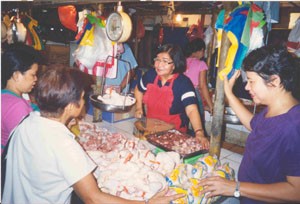
Years ago, the Muntinlupa Market was a muddy and messy public market with acrid odors created by 1,235 stalls selling everything from meat and fish to vegetables. The market’s eateries, toilets, and the stall sections generated wastewater that polluted a tributary creek of Laguna Lake, one of the most vital inland bodies of water in the Philippines and a source of drinking water and freshwater fish for Metro Manila.
To avoid further polluting the lake, Muntinlupa’s city government invested in constructing an underground wastewater treatment system. USAID helped the city design a low-cost, low-maintenance model facility, the first of its kind in the Philippines. The system uses grit screens, septic tanks, and an anaerobic-baffled reactor (an upgraded version of a septic tank) to reduce the pollution level of the wastewater. Crushed glass and coco peat are being tested as low-cost filters for the final stage of the treatment process. Coco peat, a waste product of the coconut processing industry, is widely available and is proving to be very effective in removing pollutants.
The treated water is safe to use for flushing toilets, street cleaning and watering plants. In addition, a reinforced-cement parking lot and loading dock cover the underground treatment facility, thus keeping it out of the way of an already crowded market complex.
The innovative treatment plant at Muntinlupa costs one-third less than a conventional plant to construct and less than half the cost to operate and maintain. The use of recycled water also saves the city in monthly water bills.
USAID is assisting five other cities in the Philippines to construct these highly successful, efficient, and ecologically-friendly public market treatment plants.







Comment
Make a general inquiry or suggest an improvement.